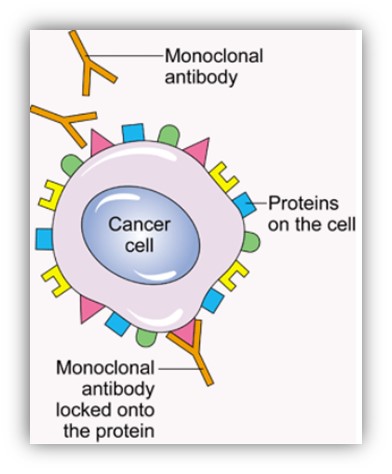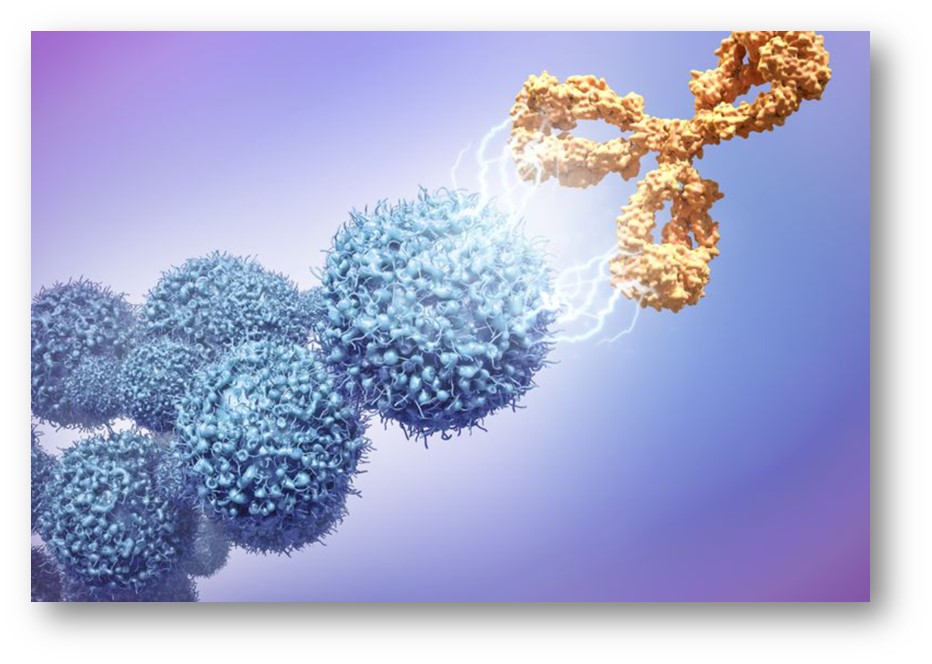Cancer immunotherapeutic technologies such as cancer vaccines, checkpoint inhibitors and antibody-drug conjugates induce the immune system to either elicit a therapeutic response or to deliver potent anti-cancer drugs with greater specificity. Over the past couple of decades, monoclonal antibody-based treatment has become one of the most successful therapeutic strategies in cancer. Monoclonal antibody therapy is a new type of targeted immunotherapy that induces the body’s immune system to specifically attack cancer cells. Among the other available cancer therapeutics, the future of monoclonal antibodies (MAbs) seems promising. At present, some monoclonal antibodies have increased the efficacy of the treatment of certain tumors with acceptable safety profiles.
What Are Monoclonal Antibodies?
Our body has its own reservoir of antibodies and whenever a foreign substance enters our body, antibodies are the saviors. They target pathogens like diseased cells or viruses. Researchers can design antibodies that specifically target an antigenic epitope found on cancer cells. These are known as monoclonal antibodies (mAbs). Once recognized, the antibodies attach to the cancer cells and call other disease-fighting warriors in the immune system. The US Food and Drug Administration (FDA) has approved more than a dozen monoclonal antibodies to fight different types of cancer. In the first clinical trial performed in advanced melanoma, monoclonal antibodies have extended some patients’ survival as much as 10 years. Monoclonal antibody drugs are cancer treatments that accelerate the functioning of the natural immune system to fight cancer. Soon after the discovery of hybridomas by Köhler and Milstein, monoclonal antibodies caught attention in the field of oncology. They have the ability to identify a suitable target antigen and kill tumor cells. Also, they simultaneously involve the host immune system to develop long-lasting effector responses against the tumor. These types of antibodies are laboratory-produced, engineered molecules that can restore, enhance or mimic the immune system's attack on cancer cells. They are designed to bind to antigenic epitopes, specifically on the surface of cancer cells.
Types of Monoclonal Antibodies
I Naked Monoclonal Antibodies
Naked monoclonal antibodies work by themselves and they are the most common kind of monoclonal antibodies particularly effective in the treatment of cancer. They have no cytotoxic chemicals attached to them. They give signals to the immune system to destroy it by marking the target cell or bind to cell surface receptors, thus blocking the binding of those proteins that help tumor cells to proliferate. Cancer has multiple escape mechanisms but naked monoclonal antibodies can block the checkpoint molecules, allowing T cells to destroy the cancer cells.
II Conjugated Monoclonal Antibodies
These types of antibodies are conjugated with a radioactive substance, a chemotherapeutic drug, or toxin that kills cancer cells recognized by the antibody. Target-specificity and limited side effects make these antibodies highly potent anti-cancer agents. Antibody-drug conjugates are antibodies that have chemotherapy drugs attached to them, target the surface of cancer cells and deliver the toxic substance to that specific area. Examples include Brentuximab Vedotin which targets CD30 antigen in Hodgkin Lymphoma and the drug attached to it is monomethyl auristatin E (MMAE). In Non-Hodgkin lymphoma, monoclonal antibodies combined with some radioactive molecules target CD20 antigens on B cells and directly delivers radioactivity to cancerous B-cells. This type of immunotherapy is known as radioimmunotherapy.
How Does Monoclonal Antibody Therapy Work?
When monoclonal antibodies enter the body and attach to cancer cells, different pathways get activated:
i. Blockade of immune checkpoints: It is one of the major mechanisms modulating the cell signaling pathway. Immune checkpoint proteins help T cells to bind to proteins on the surface of tumor cells and send an "off" signal to the T-cells; thus, prevents T-cells from destroying cancer cells. At this moment, monoclonal antibodies inhibit the binding of these checkpoint proteins to cancer cell-surface proteins, prevents "off" signal from being sent and allows T-cells to immediately kill tumor cells. Examples of checkpoint proteins found on T cells or cancer cells are PD-1/PD-L1 and CTLA-4/B7-1/B7-2. Nivolumab and Ipilimumab inhibit PD-1 and CTLA-4, respectively.
ii. Cancer cell destruction: Monoclonal antibodies help the immune system to recognize the antigen by attaching onto the antigen and bringing T-cells closer to the cancer cells and help in destruction.
iii. Cell-membrane destruction: Monoclonal antibodies have the ability to destroy the outer membrane of a cancer cell.
iv. Inhibition of cell growth: Some monoclonal antibodies bind to the cancerous cells in such a way that inhibits the binding of tumor proliferating proteins, thus blocking cell growth and prevents blood supply to tumors.
v. Delivery of radioactivity and chemotherapeutic drugs: Since monoclonal antibodies can easily attach to a cancer cell, the antibody can be used as a delivery vehicle for treatments. It can deliver chemotherapeutic drugs or radioactivity directly to cancer cells, leaving healthy cells unperturbed.
vi. Bispecific monoclonal antibodies: Few drugs combine with two monoclonal antibodies. one attaches to a cancer cell and one attaches to a specific immune system cell, thus promoting the target-specificity. These are known as bispecific monoclonal antibodies which enhances the recognition of a wide spectrum of antigens.

The Connection Between Cancer and Monoclonal Antibody Therapy
Monoclonal antibody-based technologies have been used for targeting specific cancer cells to serve either as therapeutics or in vitro diagnostics or to aid radiotherapy. Few examples are trastuzumab (Herceptin), pertuzumab (Perjeta), bevacizumab (Avastin), rituximab (MabThera) etc. Treatments have been effective for a number of cancers, such as renal cell cancer, chronic lymphocytic leukemia, colorectal cancer, head and neck cancers, bladder cancer, colon cancer, cervical cancer, Hodgkin lymphoma, skin cancer, stomach cancer, lung cancer, Non-Hodgkin lymphoma, prostate cancer, liver cancer and melanoma.
Possible Side Effects
Monoclonal antibodies are administered intravenously. Sometimes monoclonal antibody drugs are used in combination with chemotherapy or hormone therapy. Since monoclonal antibodies themselves are proteins, after administration, they can cause allergic reactions to the drug. Few common side effects are fever, chills, weakness, fatigue, muscle ache, headache, skin rashes, diarrhea etc. Sometimes it can be severe which can lead to death also.
Future Perspectives
Monoclonal antibody therapy and immune checkpoint inhibitor therapy have revolutionized the traditional cancer treatment. Monoclonal antibody and gene transfer technologies have enhanced our fundamental knowledge on antigen recognition, T cell activation as well as T cell co-stimulation, thus leading to the invention and also the success of checkpoint blockade and CAR-T cell therapy. Despite the clinical success of this therapy, therapeutic resistance remains a major challenge. However, as tumor cells mutate, they develop new antigens and checkpoint targets and the current system of rapid cancer genome sequencing can be employed to identify these novel targets for this immunotherapy.
Conclusion
The relatively recent appreciation of the effectiveness of monoclonal antibody therapy has led to a major consideration of new therapeutic combinations that employ standard chemotherapy together with immunotherapy to provide a combined approach that may enhance therapeutic responsiveness while reducing adverse side effects. The multifaceted mechanism of action and target specificity distinguishes monoclonal antibody therapy from other treatments and highlights the capability of antibodies to elicit strong antitumor responses while minimizing toxicity and adverse events. Progression of the therapy involving monoclonal antibodies will continue. They have the potential to offer curative therapy for many cancer patients. Though nanobodies, mini bodies and other antibody forms have been developed for this purpose, until now, monoclonal antibody has made a remarkable transformation from a scientific tool to a valuable drug for human therapeutics.

